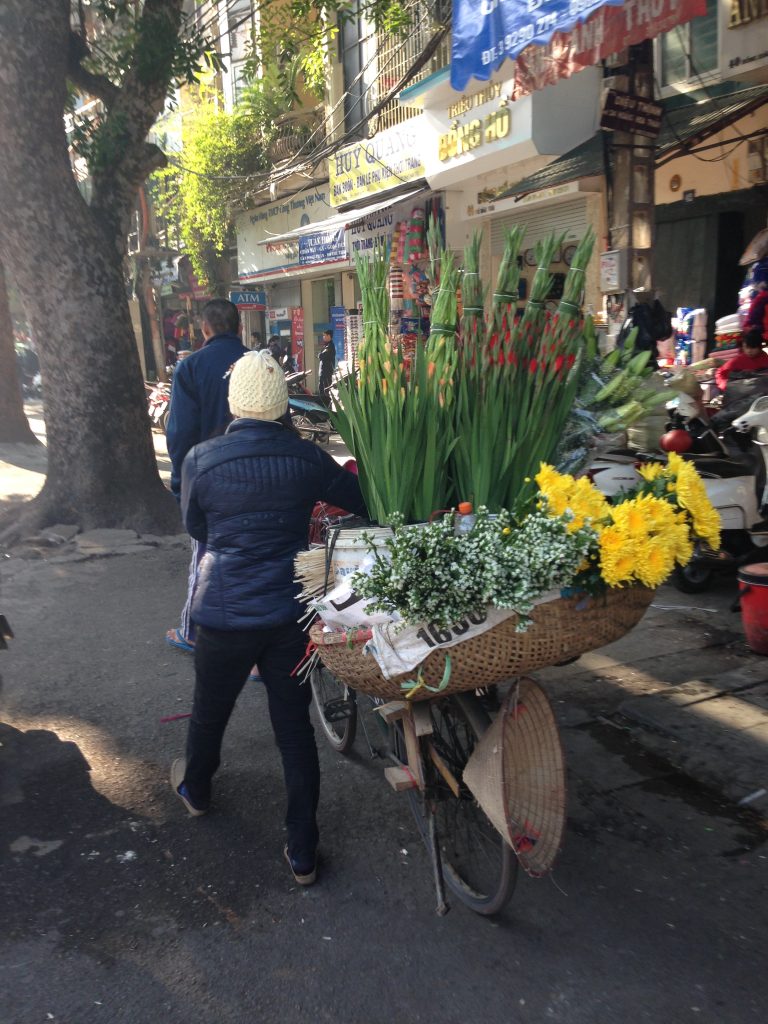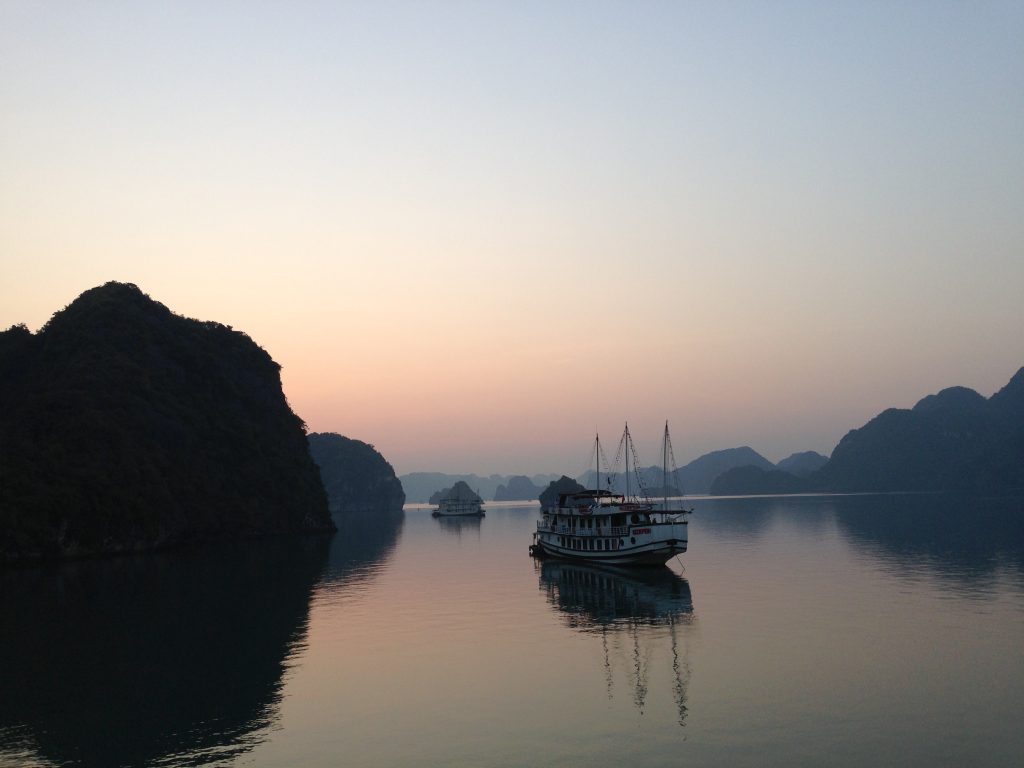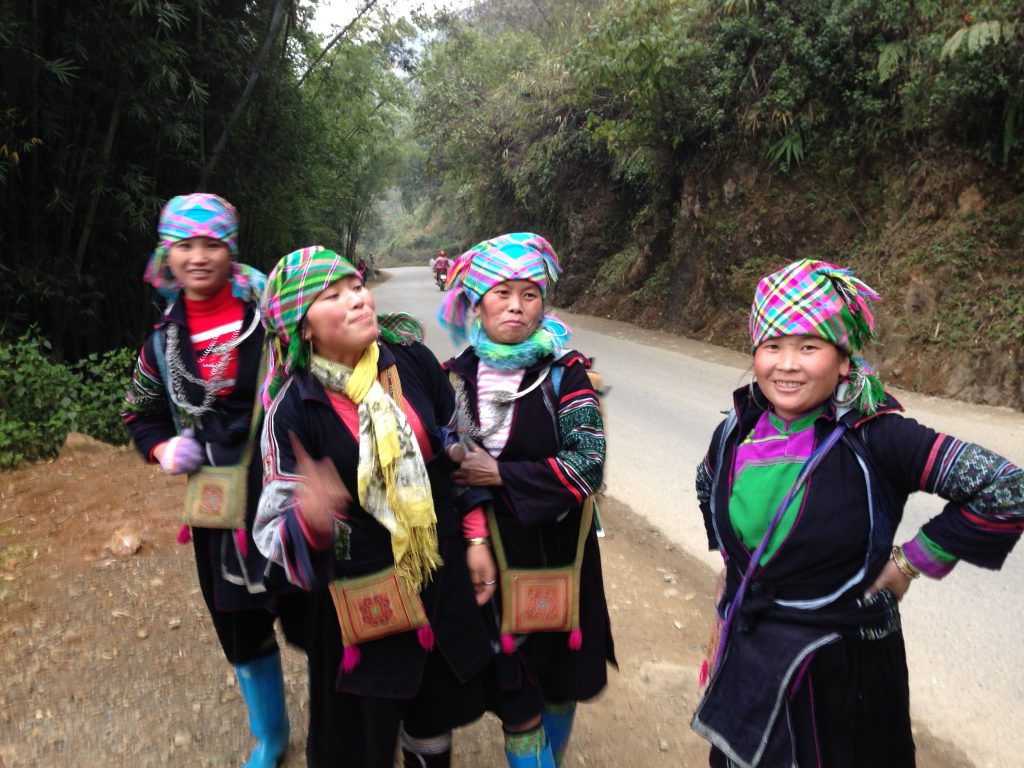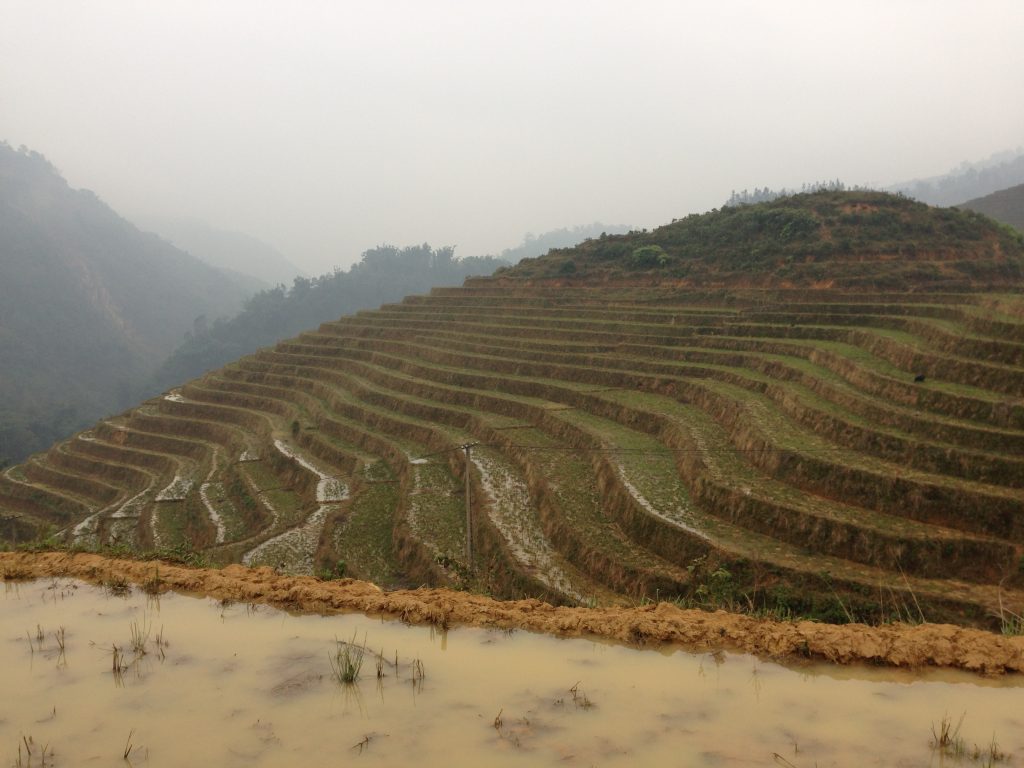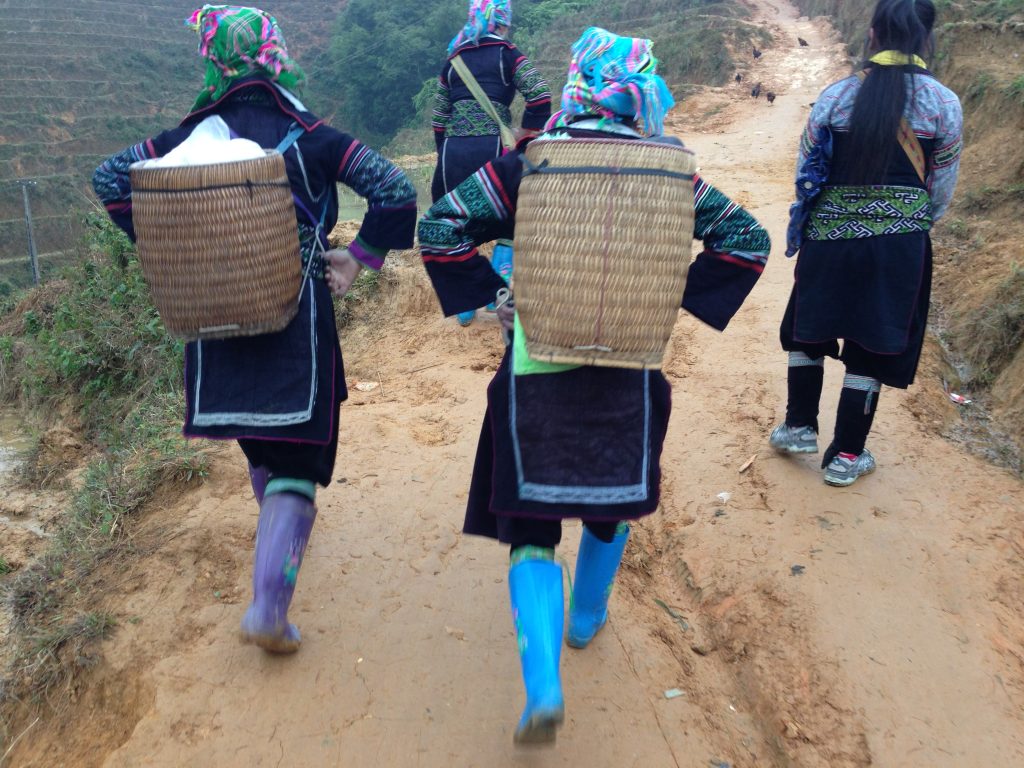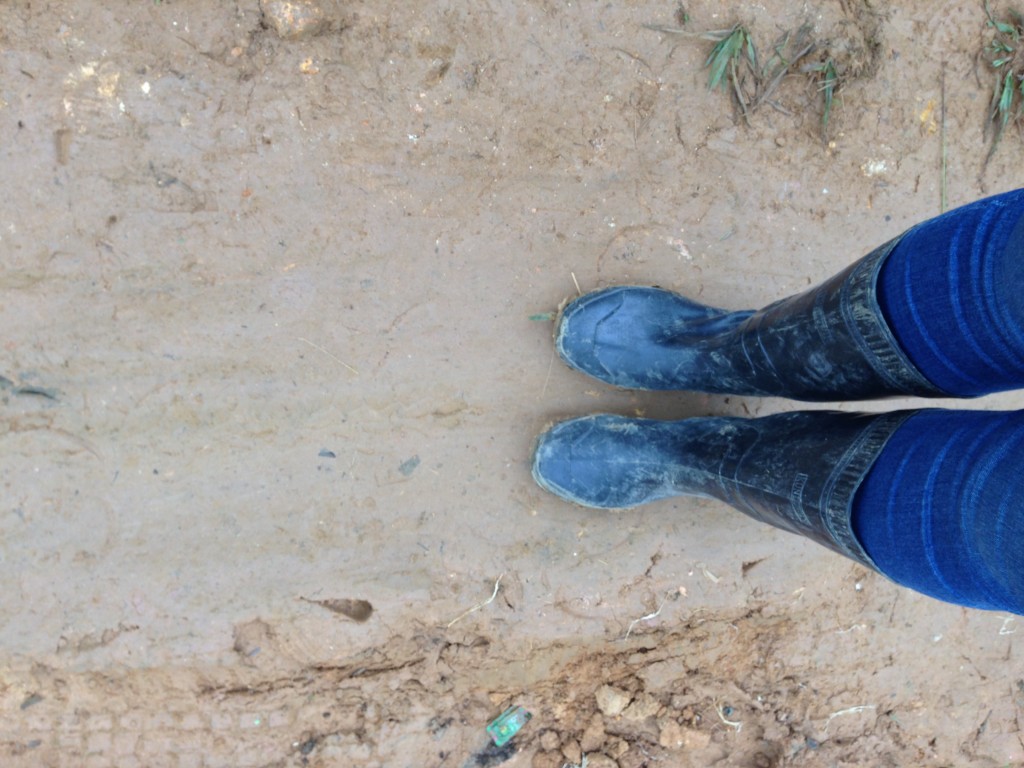Hanoi – 18 Dec 2014
Peace inside the chaos
The city throws everything at me with full force: honking horns, roaring motorbikes, merchants and traders of everything, poignant smells of freshly burnt duck skin and dark bath water running down the pavements. I’m startled at first, nothing seems familiar anymore, even though I have been here two years before. A labyrinth of samey-looking streets, the Hanoi I remembered had been swallowed by another Hanoi, noisier, brassier, dirtier. My fun memories of two years ago, swept away by this crazy tide that is the Hanoi of today.
We stop at Cafe Cong and, settling on the upstairs balcony, the street is still upon us. There is no respite, nowhere to hide, the noise is almost unbearable and I wonder how everyone else manage to sip their coffee undisturbed by the chaos which seems to have moved inside the cafe.
But I soon learn to relax into it and, as if by magic, I find peace inside the chaos. It seems fitting, with all that’s been happening to me recently, with the pressure of the last months of the year, the health scare, all packed in a short space of time, that I learn how to relax in the midst of it all, as I brave the pavements of Hanoi, ironically not worrying that I’d be ran over by a motorbike, and even more ironically, learning to trust that the crazier life gets sometimes, the easier it is to give up control and to just let it be.
How funny that so often we have to leave the overly familiar behind and venture out into the unknown to get a grip on life again. Finding peace amongst the chaos is the most important lesson Hanoi taught me and I’m determined to take it along with me everywhere. The noise around me suddenly dies out, I can no longer hear it… Next time I get restless, I’ll just recall the chaos of Hanoi to calm me down.
Halong Bay – 20/21 Dec 2014
Everything’s changed, everything is the same
The 4 hour-long bus journey from Hanoi to Halong Bay is as depressing as I remember. I slept with crooked neck most of the time to avoid looking at the industrialised scenery spooled-out on both sides of the road. As we approach the bay, I am surprised again. The entire harbour area is a large construction site: big hotels, a casino, even a dolphinarium are awaiting completion. Soon, the area will be heaving with holiday makers, taking day trips into the bay. Memories of all-inclusive resorts in Cuba spring to mind. I hope the locals will still be allowed in a few years from now… I heard that the floating villages are being relocated already from the bay.
Two years before there was nothing there. I remember we had to wait for a long time on the steps, in the cold, for the boat to pick us up. Now, large cafes serve as waiting lounges for the passengers awaiting embarkation on their respective cruise boats. I wonder how much the actual bay had changed.
Luckily, once we’re off and the last semi-completed condos on both sides of the harbour, leave my eyesight together with a bride and groom getting photographed on the farthest end of the stretch, I forget all about it, because the bay is as eerie and as quiet as I remembered. In fact I notice that it is all too quiet. No wildlife inhabits the limestone formations despite them being covered in green forests. The Cat Ba monkeys, who once reigned over the islands, are almost extinct. Only 60 of them left. Except for a few eagles, there is no sign of life. In the night, I hear the sound of a goat, most likely living on one of the fishing boats…
The next day, we kayak in a quiet spot and the silence becomes loud. It’s impossible not to feel reverent. The bay is a powerful dragon and we are all welcomed guests. For now…
Sapa – 22-23 Dec
Night train to Sa Pa
It’s dark already as we approach the train station in Hanoi. We have been given a voucher from the tourist office and told to find the Chapa Express staff to get hold of the actual tickets. The train station is dark and looks like a depot, rather than a train station. We approach a group of men stationed behind a lit counter in a corner, who appear to be working there. Apart from a few barks in Vietnamese and a ’Wait!’, they say and do nothing for a few minutes. Finally one of them produces two tickets, as if he just realised we are there.
’Where are we supposed to go?’ I ask.
One of them points his hand towards the ’main’ entrance. There is nobody there, no signs, no notifications. Where do we find our train?
A skinny man with a dark, invisible face, appears out of nowhere, takes my tickets and signals me to follow him. We practically run after him, afraid he will vanish into the night with our only proof that can get us on the train. He finally shows us inside and we sit down on the lower bunk of a four berth cabin.
’Give me money now,’ he says in surprisingly intelligible English.
I hand him a few thousand dongs.
’No,’ he says. ’Give me one hundred thousand!’
’Take it or leave it!’ I say with gritted teeth and give him a menacing look. I give him enough to buy himself a beer. He finally takes the money on offer and leaves.
’Damn, I thought there will be only two beds inside the cabin!’ He says. ’I wonder who we’ll get to share with…’’
A Chinese family shows up. They look at us and they look at their tickets. We find out we’re in the wrong cabin. That rascal. Demanding 100,000 dongs for bringing us to the wrong cabin. My blood boils as I shuffle along the carriage in search for our ’real’ cabin. We find it and we’re the first ones there. We buy a few beers from a lady with a trolley filled with drinks and snacks. We drink it in silence waiting for our ’room-mates’ to show up and bracing ourselves for a night on the sleeper train.
An Australian couple appears a few minutes later and we’re all relieved. We’re so relieved to be in each other’s company that we buy more beers and by the time we’re ready for bed, we’re drunken and exhausted. A few toilet trips later and a jiggled sleep, the train pulls in without warning in Lao Cai. I don’t even get the chance to brush my teeth before getting thrown out of the train. We don’t have organised transport and with sleep in our eyes, we get ripped off by a local for ten times the price and end up in the same mini-bus as the Aussies. But we’re all too hungover to speak.
On the way, we drive past a crowd gathered at the edge of the mountain road, looking down. I manage to take a peak at what they’re all looking at: a lorry had fallen into the river bed and most probably killed everyone inside. A motorbike goes past carrying a live pig with trembling legs, tied up in the back.
Once in Sa Pa, we ask to be dropped at the Panorama Hotel, a place recommended by another couple we had met in Halong Bay.
’Sorry, we’re fully booked!’ says the girl in reception with a large innocent smile.
’But I e-mailed you yesterday,’ I say, ’and never got a reply! Don’t you think you should have let us know you were fully booked? I tried to book through your website but the site wasn’t working!’
’Sorry,’ she insists without any visual sign that she is sorry in any way or that she’s going to find a solution to our problem.
Tired and hangover, I am feeling belligerent. Thankfully, a young man who appears to be a senior staff asks us to take a seat in the restaurant while he tries to find us a room somewhere else. Sipping on green tea I could feel my headache subsiding. It is already 10 o’clock in the morning, we are leaving the next day and don’t even have a room for the night. I should have probably planned this better, I think.
Soon we check in to Sapa House and for 35 USD a night, we get a beautiful and spacious room. Things are beginning to look up.
*
She is as tiny as they get. A child-like size girl, with olive skin clad in traditional H’mong clothing and a multicoloured head scarf is to be our guide for the day.
’Call me Lala!’ she says with a husky voice, revealing beautiful brown eyes and a wide face. She is so pretty. I can’t stop staring.
We take the elevator down and walk into the street. Three tribeswomen materialise our of thin air and start walking behind us.
’Where are you from?’ they ask in one voice.
’Romania,’ I say.
’How old are you?’ one asks.
’35,’ I say.
’Just like me!’ she smiles through gapped teeth. ’Do you have any children?’
’No children!’
’I have three,’ she says.
Inside, I start to feel apologetic about being motherless.
’How old are you?’ another one asks Him.
’45’ he said.
’You lucky man!’ they giggle. ’Young girlfriend!’
’Who are they?’ I ask Lala.
’Girls from the tribe. When they don’t work in the rice fields they go around town and follow tourists!’ she answers matter of factly.
The giggles behind us intensify.
’You’re funny!’ I say turning around to look at them.
’You’re funny!’ they answer in a chorus.
We have not one, but an entourage of four local H’mong women for the day. As we leave Sapa town, we start on mud paths between rice terraces and bamboo trees. It is a misty day and we can’t see the entire valley, but what we see is enough to make our hearts stop with awe. White wild ducks scattered all over rice terraces feeling at home with wild-looking pigs and water buffaloes, as far as the eyes can stretch.
’Here’s a white one!’ Lala says pointing towards a white buffalo.
’I’ve never seen a buffalo before,’ He says.
’Hahaha, you’ve never seen a buffalo before! This is so funny!’ comes Lala’s hearty laughter.
’Imagine how beautiful it must be in the summer,’ I say. ’Green rice growing everywhere, able to see the mountains…’
’It is already beautiful!’ He says and for a while we walk in complete silence. The girls make us little figures out of long grass.
’What’s this?’ I ask looking at the intricately woven thing one of them handed me.
’A horse!’
A horse, of course! It even has a tail. Shortly, a grass heart follows.
The paths become muddier and muddier and I struggle to keep my balance. Two of the women grab my arms and carry me for a few miles until we stop for lunch. I can hardly keep up with them. They find my clumsiness terribly amusing.
’Now you buy from us!’ they say as we finally stop for lunch.
’Sure! Let’s do it!’ I say looking at my boots covered in three generations of mud, in full knowledge that their help needed to be repaid.
The put their wicker baskets down and start bringing out hand-made pillow cases, tiny bags and purses. I opt for a bag and a pillow case. He is cornered and already holding two pillow cases in hand.
’You’re going to have to give me money!’ He says.
’What are you doing with two pillow cases?’ I shout. ’I’m also buying one!’
’She’s forcing two on me!’ and we both start laughing.
The girls are trying hard to make the best sale. I am bargaining ferociously. In the end we agree on two over-priced pillow cases and a small bag I’m never going to use. But it’s worth it.
We stop for lunch and, we’re either hungry or it’s the best lunch we’re ever had. Fresh pieces of tofu, scrambled egg, stir friend vegetables with chicken, sticky rice. We eat like there’s no tomorrow. Below us, a montain river roars. I am unsure whether it’s just the water, or a storm started outside.
Lala has taken her head scarf off and a big red spot is visible on her forehead.
’It’s from hot buffalo horn,’ she explains. ’For headache! I use it for sore throat too!’ she says and I now notice burn lines down her neck. It looks violent, but I suppose it’s not worse than cupping.
We say goodbye a couple of miles later, as we wait for the car to pick us up. She produces needle work from her tiny bag and starts sewing. ’It’s for my collar,’ she explains.
I am impressed by how good her English is and I say so in the little feed-back paper she asks us to complete.
She’s lucky, she says, she speaks English and can work as a tour guide. She learnt it from tourists.
I bow in appreciation. Little mountain goat…

